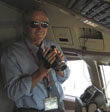Biography:Edwin Hutchins

Edwin Hutchins (b. 1948[1]) is a professor and former department head of cognitive science at the University of California, San Diego. Hutchins is one of the main developers of distributed cognition.
Hutchins was a student of the cognitive anthropologist Roy D'Andrade and has been a strong advocate of the use of anthropological methods in cognitive science. He is considered the father of modern cognitive ethnography.[2] His early work involved studies of logic in legal discourse among people of the Trobriand Islands, Papua New Guinea.[3]
For a time he worked in the Navy doing research on how crews of a ship can function as a distributed machine, offloading the cognitive burden of ship navigation onto each member of the crew. He was a recipient of the prestigious MacArthur "Genius Grant".[4]
In 1995, Hutchins published Cognition in the Wild,[5] a detailed study of distributed cognitive processes in a navy ship (an Iwo Jima-class amphibious assault ship[6]); like other works related to distributed cognition, it criticizes disembodied views of cognition and proposes an alternative which looks at cognitive systems that may be composed of multiple agents and the material world.
Other areas of his work include the study of airline cockpits,[7] the development of cognitive ethnographic methods and tools, and human-computer interaction. He ran the Distributed Cognition and Human Computer Interaction Laboratory at UC San Diego, in collaboration with James Hollan until 2014. He is now professor emeritus in the UC San Diego Department of Cognitive Science.
References
- ↑ http://faculty.lawrence.edu/wp-content/uploads/sites/18/2015/11/DCog.pdf
- ↑ "Edwin Hutchins: Publications, bio, bibliography, etc." (in en). https://www.interaction-design.org/literature/author/edwin-hutchins.
- ↑ Hutchins, Edwin (1980). Culture and Inference: A Trobriand Case Study. Cambridge, Massachusetts: Harvard University Press. https://archive.org/details/cultureinference0000hutc.
- ↑ "MacArthur Foundation" (in en). https://www.macfound.org/fellows/254/.
- ↑ Hutchins, Edwin (1995). Cognition in the Wild. Cambridge, Massachusetts: MIT Press.
- ↑ Although Hutchins does not mention the ship class by name, he characterizes it as a 592-foot-long (180 m) amphibious helicopter carrier (Cognition in the Wild, p. 7). In 2018 he mentioned that the vessel was USS Okinawa.
- ↑ Hutchins, E. (1995). How a Cockpit Remembers Its Speeds. Cognitive Science, 19(3), 265-288.
External links
